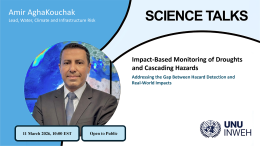In an increasingly interconnected and globalized world, COVID-19 has been a drastic reminder of the cascading, complex and systemic nature of risks. Over the past year, the world has witnessed how COVID-19, often exacerbated by the concurrence of climate-related exteme events, natural and man-made hazards, has led to devastating direct and indirect impacts on health, social, economic and financial systems while cascading across sectors and countries. The Sendai Framework for Disaster Risk Reduction promotes a holistic understanding and governing of the dynamic nature of systemic risks, yet many countries lack the means to assess and manage risks in a holistic and integrated manner. Funded by the UN Office for Disaster Risk Reduction (UNDRR), the project aims to address that gap by developing a conceptual model that supports the analysis of systemic and cascading risks by understanding systems, decision-making processes and other factors that contributed to making vulnerable communities, sectors and systems more at-risk. Further, the team will work in five different case studies (Bangladesh, Ecuador, India, Indonesia, and Togo) to document specific country-level examples that show how the pandemic exacerbated risks in specific contexts (incl. urban areas and humanitarian settings), and what actions were taken to avert, minimize and address compounding, cascading and systemic risks and impacts associated with COVID-19. Finally, policy recommendations will be developed to help countries better prepare for and manage such risks in the future.
- Project Manager
- Dr. Michael Hagenlocher




